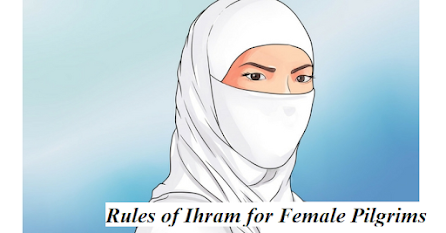At the point when a Muslim lady is preparing to go for Hajj or Umrah, there are sure things that become illegal for her from the time she enters the state of Ihram until when the journey has been finished. So, our travel agency with cheap December Umrah Packages offered the article on the Hajj Ihram rules for women pilgrims for the awareness of the general rules of Ihram.
A Lady's Clothing regulation for Hajj
Despite the fact that men have an endorsed clothing standard for Hajj that comprises two pieces of unstitched material, there are no comparable explicit pieces of clothing for a lady. All things considered, it’s exhorted that ladies follow the typical clothing standard of Islam and wear garments that are loose in fitting and don't call for attention. It is ideal to wear lightly shaded garments, and you should forgo wearing scent or some other cosmetic item. Numerous ladies decide to wear white shaded abayas and scarves to mix in with their male mates, yet this isn't mandatory.
What should be done Prior to Entering the state of Ihram
- Trim nails and hair (counting the armpit and private areas).
- Scrub down of Ghusl.
- Ask fardh supplication (if necessary) and ask two rakats of Sunnah.
What are the restrictions During Ihram?
Coming up next is a list of things from which Muslim ladies are restricted when they are in the state of Ihram, that is generally legitimate. When the Hajj or Umrah has been finished and the Ihram is invalidated, a large portion of them become legal indeed.
- Wearing splendid, tight-fitting clothes.
- Cutting the nails and managing or shaving substantial hair.
- Utilizing aroma, scented oils, or corrective items (counting kohl, contact focal points, and so forth).
- watching oneself in the mirror fully intent on embellishing oneself.
- Wearing gems for embellishment.
- Covering the face and hands.
- Having sex with one's better half.
- Getting married.
- Battling, utilizing unpleasant language, or slander.
- Pulling teeth or drawing blood.
What is Permitted During Ihram?
There are sure things that are female explorers might do, even in the state of Ihram. Here are the things that a female traveler is permitted to do.
- Wearing closed shoes, socks, and so on.
- Utilizing moisturizers and creams if there should be an occurrence of clinical need.
- Checking out the mirror in case it isn't to decorate oneself (for example in case it is inside the washroom).
- Concealing themselves under non-fixed substances like vehicles, and so on.
- Wearing endorsed glasses and utilizing cameras.
Ihram Rules for Menstruating Ladies
If a lady is bleeding when she passes the miqat (the point for accepting the state of Ihram). Then, at that point, she ought to do ghusl and wear the Ihram similarly as she would in case she was in an ordinary state. Her ihram is legitimate, and she should do every one of the demonstrations of Hajj except for Tawaf and Sa'e, which she can procrastinate on for some other time. Yet, assuming she has effectively done tawaf when she gets her period, she can progress forward with Sae, and manage the hair. Similar guidelines apply to ladies who are yet draining after childbirth. Assuming they do any remaining fundamental demonstrations of Umrah or Hajj, their journey will be acknowledged with the finesse of Allah SWT. Prophet PBUH said to Aishah when she bled during umrah that does all that the explorers do, yet don't circumambulate the Kaabah until you become pure.


